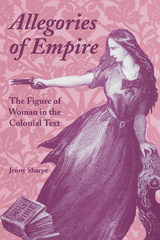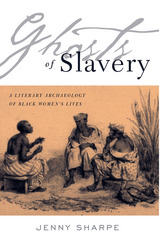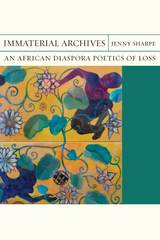3 books about Sharpe, Jenny

Allegories of Empire
The Figure of Woman in the Colonial Text
Jenny Sharpe
University of Minnesota Press, 1993
Allegories of Empire was first published in 1993.“Allegories of Empire re-constellates a metropolitan masterpiece, Forster’s A Passage to India, within colonial discourse studies. Sharpe, a materialist feminist, is scrupulous in her use of theory to articulate nationalism, historical race-gendering, and contemporary feminist critique.” -Gayatri Chakravorty Spivak, Columbia University“Jenny Sharpe has done a great service in opening up the virtually taboo subject of the rape of the white woman by the colored man, and, furthermore, in teaching us theory - making by locating this frenzy of fantasy and reality within a specific crisis of European colonialism in India. ... In showing how a ‘wild anthropology’ must continuously rework feminism in the face of racism, and vice versa, she shows how the margins of empire were and still are at its center.” -Michael Taussig, New York UniversityAllegories of Empire introduces race and colonialism to feminist theories of rape and sexual difference, deploying women’s writing to undo the appropriation of English (universal) womanhood for the perpetuation of Empire.Sharpe brings the historical memory of the 1857 Indian Mutiny to bear upon the theme of rape in British adn Anglo-Indian fiction. She argues that the idea of Indian men raping white women was not part of the colonial landscape prior to the revolt that was remembered as the savage attack of mutinous Indian soldiers on defenseless English women.By showing how contemporary theories of female agency are implicated in an imperial past, Sharpe argues that such models are inappropriate, not only for discussion of colonized women, but for European women as well. Ultimately, she insists that feminist theory must begin from difference and dislocation rather than from identity and correspondence if it is to get beyond the race-gender-class impasse.Jenny Sharpe received her Ph.D. in comparative literature at the University of Texas at Austin and is currently a professor of English at the University of California at Los Angeles. She has contributed articles to Modern Fiction Studies, Genders, and boundary 2.
[more]

Ghosts Of Slavery
A Literary Archaeology of Black Women’s Lives
Jenny Sharpe
University of Minnesota Press, 2002
Questions traditional assumptions about power and agency in slave women's everyday lives.
Through their open defiance, women like Harriet Tubman and Sojourner Truth had a significant impact on the institution of slavery. But what of the countless other women who did not commit public or even private acts of resistance? Are their stories worthy of our attention? While some scholars imply that only the struggle for freedom was legitimate, Jenny Sharpe complicates the linear narrative-from slavery to freedom and literacy-that emerged from the privileging of autobiographical accounts like that of Frederick Douglass. She challenges a paradigm that equates agency with resistance and self-determination, and introduces new ways to examine negotiations for power within the constraints of slavery.
In Ghosts of Slavery, Sharpe introduces a wider range of everyday practices by examining the lives of three distinctive Caribbean women: a maroon leader, a mulatto concubine, and a fugitive slave. Through them she explains how the diasporic experience of slavery enabled black women to claim an authority that they didn't possess in Africa; how concubines empowered themselves through their mimicry of white women; and how less-privileged slave women manipulated situations that they were powerless to change. Finding the highly mediated portrayal of slave women in the historical records limited and sometimes misleading, Sharpe turns to unconventional sources for investigating these women's lives. In this fascinating and historically rich account, she calls for new strategies of reading that question traditional narratives of history, and she finds alternative ways to integrate oral storytelling, slave songs, travel writing, court documents, proslavery literature, and contemporary literature into black history.
Ultimately, this layered approach not only produces a more complex picture of the slave women's agency than conventional readings, it encourages a more nuanced understanding of the roles of slaves in the history of slavery.
Jenny Sharpe is professor of English and comparative literature at the University of California, Los Angeles, and author of Allegories of Empire: The Figure of Woman in the Colonial Text (1993).
[more]

Immaterial Archives
An African Diaspora Poetics of Loss
Jenny Sharpe
Northwestern University Press, 2020
In this innovative study, Jenny Sharpe moves beyond the idea of art and literature as an alternative archive to the historical records of slavery and its aftermath. Immaterial Archives explores instead the intangible phenomena of affects, spirits, and dreams that Caribbean artists and writers introduce into existing archives. Through the works of Frantz Zéphirin, Edouard Duval-Carrié, M. NourbeSe Philip, Erna Brodber, and Kamau Brathwaite, Immaterial Archives examines silences as black female spaces, Afro-Creole sacred worlds as diasporic cartographies, and the imaginative conjoining of spirits with industrial technologies as disruptions of enlightened modernity.
[more]
READERS
Browse our collection.
PUBLISHERS
See BiblioVault's publisher services.
STUDENT SERVICES
Files for college accessibility offices.
UChicago Accessibility Resources
home | accessibility | search | about | contact us
BiblioVault ® 2001 - 2024
The University of Chicago Press









